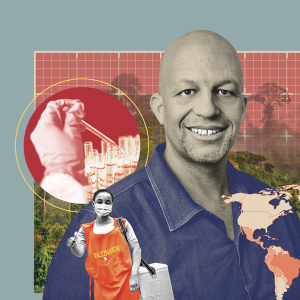A Common Type of Fiber May Trigger Bowel Inflammation
Discovery

Inulin, a type of fiber found in certain plant-based foods and supplements, causes inflammation in the gut and exacerbates inflammatory bowel disease in a preclinical model, according to a recent study by Weill Cornell Medicine investigators. The surprising findings could pave the way for therapeutic diets that may help ease symptoms and promote gut health.
The study, published in the Journal of Experimental Medicine, shows that inulin — found in foods like garlic and leeks, commonly used fiber supplements and foods with added fiber — stimulates microbes in the gut to release bile acids that increase the production of molecules that promote intestinal inflammation.
Dietary fiber, including inulin, is considered an essential part of a healthy diet for most people. Gut microbes turn dietary fiber into short-chain fatty acids that turn on regulatory T cells, immune cells that help reduce inflammation and have other beneficial effects throughout the body. Because of these benefits, there has been a remarkable rise in use of dietary fiber as an additive in both foods and supplements, and purified inulin or inulin-rich chicory root is often the main source of the fiber.
“Inulin is now everywhere, from clinical trials to prebiotic sodas,” says the lead author of the study, Dr. Mohammad Arifuzzaman, assistant professor of immunology in medicine.
Dr. Arifuzzaman and his colleagues expected that inulin would also have protective effects in inflammatory bowel disease. But they found just the opposite.
In preclinical models of inflammatory bowel disease, the introduction of inulin set off a chain reaction, causing the immune system to produce cells called eosinophils, which can increase inflammation and tissue damage. While a 2022 study by the same team of investigators showed that this flood of eosinophils may help protect against parasite infection, in the inflammatory bowel disease model, it exacerbated intestinal inflammation, weight loss and other symptoms like diarrhea.
Translational patient-based studies also showed that patients with inflammatory bowel disease had higher levels of bile acids in their blood and stool and excessive levels of eosinophils in their intestine compared with people without the condition.
These unexpected discoveries not only may help explain why high-fiber diets often exacerbate inflammatory bowel disease in patients, they may also help scientists develop therapeutic diets to reduce symptoms and gut damage in patients with inflammatory bowel disease or related conditions.
“The present study shows that not all fibers are the same in how they influence the microbiota and the body’s immune system,” says senior author Dr. David Artis, director of the Jill Roberts Institute for Research in Inflammatory Bowel Disease and director of the Friedman Center for Nutrition and Inflammation, both at Weill Cornell Medicine, and Michael Kors Professor in Immunology.
Fall 2024 Front to Back
-
From the Dean

Message from the Dean
By integrating innovations in artificial intelligence into clinical practice, the aim is to enhance, rather than replace, the personal care that patients value. -
Features

Change of Heart
To tackle long-standing sex disparities in outcomes for cardiac surgery, Weill Cornell Medicine physicians are pursuing innovative clinical trials and treatment -
Features

The Dark Side of STING
Painstaking research has yielded vital new insights on how a protein known for triggering inflammation can both hinder — and accelerate — cancer -
Features

Teaching Empathy in the Digital Age
Meet C.A.R.L., a lifelike virtual “patient” who stands at the vanguard of advances in immersive learning that could improve the way doctors are trained. -
Notable

New Chair and Physician-in-Chief
Dr. Myles Wolf, who specializes in nephrology, will oversee Weill Cornell Medicine's largest clinical and academic department. -
Notable

Dateline
Dr. Sasha Fahme is leading studies to better understand the sexual health challenges refugee women face. -
Notable

Overheard
Weill Cornell Medicine faculty members are leading the conversation about important health issues across the country and around the world. -
Notable

News Briefs
Notable faculty appointments, honors, awards and more — from around campus and beyond. -
Grand Rounds

Lending an Ear
How a single-sided cochlear implant is helping a psychiatry resident achieve his dreams. -
Grand Rounds

The Art of Medicine
Through visits to the Guggenheim and more, medical students are expanding their thinking to improve patient-centered care. -
Grand Rounds

News Briefs
The latest on teaching, learning and patient-centered care. -
Discovery

Unraveling the Riddle of Suicide Risk
Researchers are identifying new preventive strategies by leveraging cutting-edge computational techniques and cross-disciplinary strategies. -
Discovery

A Common Type of Fiber May Trigger Bowel Inflammation
An unexpected finding could pave the way for therapeutic diets that ease symptoms and promote gut health. -
Discovery

Findings
The latest advances in faculty research, published in the world’s leading journals. -
Alumni

Profiles
From leading the Alumni Association to improving public communication of science, our alumni are making an impact. -
Alumni

Notes
What’s new with you?
Keep your classmates up to date on all your latest achievements with an Alumni Note. -
Alumni

In Memoriam
Marking the passing of our faculty and alumni.
-
Alumni

Moments
Marking celebratory events in the lives of our students and alumni, including the White Coat Ceremony and Reunion. -
Second Opinion

Taming Weed
How can medicine and public health address largely unregulated, readily available and potentially harmful marijuana products? -
Exchange

Roles in Research
A physician-scientist and a college student discuss how undergraduate research opportunities can boost the STEM pipeline of those from historically underrepresented communities. -
Muse

Making the Music
Clinical psychologist Dr. Robert Allan finds inspiration from composing and playing the piano. -
Spotlight

Therapeutic Advocate
In his quest to help more patients, Dr. Joseph Amprey (M.D. ‘04, Ph.D. ‘02) shifted from clinical practice to drug development.